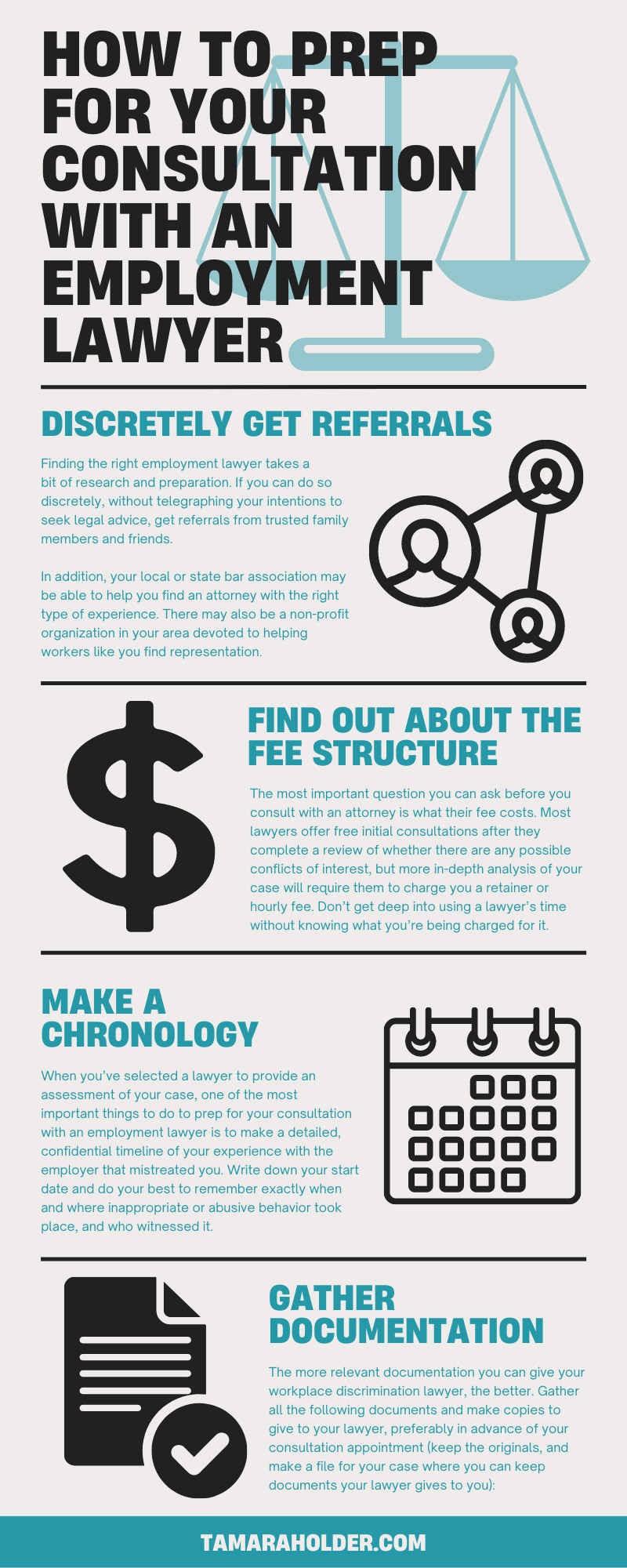When a job turns toxic, you might be thinking about hiring an attorney to help you right the wrongs you believe have been done to you at work. If you think you’ve been the victim of unlawful employment discrimination or wrongful termination, learn how to prep for your consultation with an employment lawyer.
Finding the right employment lawyer takes a bit of research and preparation. If you can do so discretely, without telegraphing your intentions to seek legal advice, get referrals from trusted family members and friends.
In addition, your local or state bar association may be able to help you find an attorney with the right type of experience. There may also be a non-profit organization in your area devoted to helping workers like you find representation.
Remember that not all types of workplace mistreatment, or perceived mistreatment, rise to the level of actionable, unlawful discrimination. Your employer’s actions must have been based on your sex (including sexual orientation or gender identity), race, national origin, religion, disability, age, marital status, or pregnancy.
If your employer is a jerk and your workplace is miserable, but your boss’s behavior and lousy working conditions aren’t based on those protected categories, you may not have a case. However, that’s for your lawyer to decide.
The most important question you can ask before you consult with an attorney is what their fee costs. Most lawyers offer free initial consultations after they complete a review of whether there are any possible conflicts of interest, but more in-depth analysis of your case will require them to charge you a retainer or hourly fee. Don’t get deep into using a lawyer’s time without knowing what you’re being charged for it.
When you’ve selected a lawyer to provide an assessment of your case, one of the most important things to do to prep for your consultation with an employment lawyer is to make a detailed, confidential timeline of your experience with the employer that mistreated you. Write down your start date and do your best to remember exactly when and where inappropriate or abusive behavior took place, and who witnessed it.
Also write down the dates and duration of any significant job changes that your employer imposed on you. This is especially important if you left your job because your employer made it unbearable for you to stay.
Make detailed notes for each entry. Your chronology should include not just your start date, but who your supervisor was at the time you were hired. Include the details of what you believe was discriminatory behavior or inappropriate comments, including exactly what was said or done and who said or did it.
If you know that other workers were treated differently and better than you were, and you believe this was because of your status as a member of one of the protected classes listed above, provide details that show how others got better treatment than you did.
Similarly, if you know of other workers like you who endured similar treatment, write that down, too. Make notes about how these actions affected you emotionally and financially, and what you did about it. Did you complain to your HR department? If so, did they investigate? What conclusions, if any, did they reach? Did you never hear anything further on your complaints?
The documents you give your lawyer are confidential, and you should treat your copies as such also. Place your records for the case, including all your notes and timelines, in a locked drawer or file cabinet and keep the keys secured.
The more relevant documentation you can give your workplace discrimination lawyer, the better. Gather all the following documents and make copies to give to your lawyer, preferably in advance of your consultation appointment (keep the originals, and make a file for your case where you can keep documents your lawyer gives to you):
Your attorney may ask for additional documentation and will explain to you why it is needed.
Be on time; this is critical. You are paying for your lawyer’s time, and punctuality speaks to your commitment to addressing your concerns. Make sure you schedule your consultation for a time when you know you can show up and stay for as long as you need to.
Attorney-client communications are confidential and privileged. Your lawyer cannot discuss your case with anyone without your permission. Even if you give permission, you might unwittingly compromise confidentiality if your spouse or significant other doesn’t understand how critical it is to keep these communications private. Your partner can come with you to your lawyer’s office to provide moral support, but make it clear to them they won’t be sitting in on the conversation.
Tell your lawyer the full story, warts and all, even if it means describing language you used or behavior you engaged in that puts you in a negative light. It’s better to be prepared for whatever your employer may say about you to try to discredit your claim.
After all this preparation, you may find that your lawyer thinks your case is weak, and could be prohibitively costly to pursue. It doesn’t mean the attorney won’t try to get you some redress of your grievances, but the result may not be what you were hoping.
If your lawyer believes your case is meritless and involves resentment or revenge instead of genuinely viable legal claims, they’ll tell you so and politely decline the representation.
Seeking compensation or other relief from employment discrimination can be a tough road, but where your claims demonstrate that you have been the victim of unlawful action, pursuing those claims can be worth it. Even if the outcome isn’t what you’d hope, you will have shown your employer that you don’t put up with discriminatory treatment, and neither do any of your coworkers.
